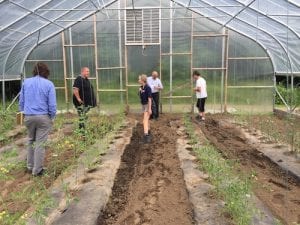“The mission statement of the Mashantucket Pequot Tribal Nation (MPTN) states they will ‘…establish a social, cultural and economic foundation that can never be undermined or destroyed…,’” says Tribal Councilor Daniel Menihan, Jr. MPTN was facing challenges growing their fruits and vegetables at a scale to meet the tribe’s needs on their land in Ledyard, and some members were struggling with diabetes.
UConn has enjoyed a long history of engagement with members of the Mashantucket Pequot Tribal community. Many members have graduated from UConn and served on the UConn Foundation Board, among others. Despite the fact that there is an Extension office only 10 miles from the reservation, MPTN has rarely participated in any educational outreach or training offered by UConn Extension.
UConn Extension received the four-year Federally Recognized Tribes Extension Program (FRTEP) grant from USDA-NIFA with the goal of having the tribe share their ideas for growing food and health, and help them learn about the Extension resources that are available. As a result of the grant, the relationship between MPTN and UConn is strengthening, and there is growth in agricultural production, food security, and health for the tribal people.

“MPTN is still learning, but they are now able to grow their own food, in what looks like a commercial setting,” states Shuresh Ghimire, PhD, Vegetable Crops Extension educator and principal investigator on the grant. “They have high tunnels, a rototiller, a plastic mulch layer, and cold storage, which are common tools for a commercial farm.”
Extension provides expertise through one-on-one consultation, and classroom and hands-on training on-site in a collaborative setting. Educational outreach addresses the following critical areas identified by the MPTN Council:
- Improve food security
- Improve economic viability
- Improve youth engagement and communications
- Improve nutrition and diabetes awareness through collaborative education
An Extension program involving several specialists in fruit and vegetable production, farm business management, marketing, 4-H youth development, health and nutrition, communications, evaluation and assessment is working with the MPTN on their goals. Tribal members are participating in other Extension programs, beyond the scope of the grant. A 4-H club is being established at MPTN to increase opportunities for youth.
“Once this grant came, we started working with UConn Extension Educators. There has been a substantial gain in the knowledge and skills regarding growing food, writing a business plan, nutrition, and health,” says Jeremy Whipple, a MPTN member.
Growing with MPTN
Extension provides education for MPTN in state-of-the-art sustainable vegetable and fruit production techniques, and

through collaboration with MPTN, is melded with traditional and historical tribal farming methods. This provides MPTN with a means to continue the richness of their history while moving into modern sustainable farming economically.
Tribal youth are included in all aspects of the agricultural venture with the tribe’s expectation that several youth will develop major roles in the business venture. Two tribal youth are being paid by the grant to work in vegetable production at MPTN.
“Learning how to grow tomatoes, including pest management, is one of the many things I enjoy working with on this grant” Ernest Pompey, one of the tribal youths working on this grant says. “I am excited to share what I learned about growing and eating healthy food to other youth in my community.”
“The tribe also established a community garden where they bring other youth from the community to teach them about growing. The knowledge is expanding within their own community, and they are teaching each other now,” Shuresh says.

UConn Extension’s nutrition team is working with the tribal community health providers to deliver educational programming in healthy eating and diabetes prevention using classroom education, and hands-on learning in the selection and preparing of healthy food, and exercise through gardening. The goal is to reduce the risk and incidence of diabetes in the tribal community.
“The Expanded Food and Nutrition Education Program (EFNEP) utilizes a hands-on approach to nutrition education, combining nutrition knowledge with enhancement of skills to apply this knowledge to prepare healthy foods that are convenient, affordable and culturally appropriate,” says Mike Puglisi PhD, RD, state EFNEP director. “Erica Benvenuti, New London County nutrition educator, taught children in the MPTN High 5 Program the importance of food safety and increasing vegetable intake, and enhanced learning through getting the children involved in preparation of a traditional recipe prepared by the MPTN, the Three Sisters Rice recipe.”
The grant is starting its third year, and another Extension educator is working with tribal youth and adults in developing a business plan for the agricultural venture to increase their success rate. Youth and adults are also learning about their agricultural history and how it can successfully be integrated into today’s modern sustainable agriculture by combining classes with in-field learning experience.
“Ultimately, after the grant ends, MPTN’s farm will operate as a commercial vegetable farm would in terms of production and reaching out to Extension when they do need help. They will be independent, and continue growing their operation to support the goals of the tribal nation,” Shuresh states.
Article by Stacey Stearns and Shuresh Ghimire